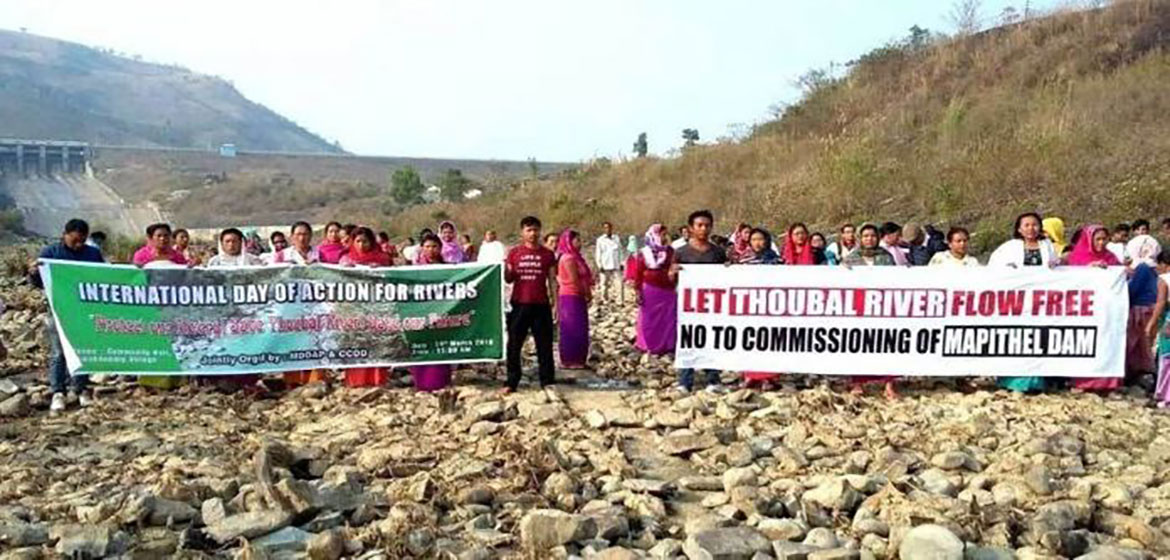The dam project has cut off water supply to some parts of the state and submerged vast tracts of land in others.
The official statement notifying Narendra Modi’s visit to Manipur on March 16 outlines its main agenda: inauguration of the 105th Indian Science Congress at Manipur University and other development projects. A major project the prime minister was supposed to launch is the Mapithel dam, part of the Thoubal Multipurpose Project.
As things stand now, that will not happen.
The Joint Action Committee Against Forced Inauguration of Mapithel Dam, an umbrella body of 20 groups representing various communities claiming to have been affected by the project, had threatened a 48-hour shutdown to coincide with the dam’s scheduled inauguration by Modi on March 16. The committee withdrew its call late on March 14, reportedly after the Manipur government agreed to shelve the inauguration.
Irengbam Arun, media adviser to Chief Minister N Biren Singh, confirmed this. “We felt that it was not right to inaugurate the project until all its components are complete,” he said.
The action committee is primarily demanding compensation for the people displaced by the project as mandated by the Right to Fair Compensation and Transparency in Land Acquisition, Rehabilitation and Resettlement Act, 2013. “We are against the commissioning of the dam until grievances of the affected people are addressed and our rights are respected,” said Letsei Mate, the action committee’s general secretary.
A string of delays
The Thoubal Multipurpose Project, located in the Mapithel valley in the hill districts of Urkhul and Senapati, was approved by the Planning Commission in 1980. Construction started in 1989. The stated objective was to use water from the Thoubal river for irrigation, drinking and to generate electricity.
The project’s annual irrigation potential is 33,400 hectares and its drinking water supply capacity is 45.46 million litres a day, most of which would be directed to Imphal. In addition, it is supposed to produce 7.5 megawatts of power for rural electrification.
But the project has seen inordinate delays over the years, and is still not fully functional. In 2015, the flow of the Thoubal river was blocked, courtesy the Mapithel dam. Activists say while none of the stated objectives of the project have been achieved yet, the blocking of the river has wreaked havoc for local communities.
“Now there is no water downstream,” said Ram Wangkheirakpam, director of Indigenous Perspectives, a non-profit in Imphal that works on environmental issues. “People are dependent on the water for fishing and farming activities,” he said. “People have lost their livelihood. The question is why did they block the river and deprive people of their land and livelihood three years before the project was complete?”
The delays have also hugely escalated the cost. In 1980, the project was conceived at an estimated cost of Rs 47.25 crore. In 2016, revised estimates pegged the cost at over Rs 1,500 crore.
Facing resistance
Apart from complaints of inadequate compensation, opposition to the commissioning of the dam itself has grown louder over the years. Local communities claim the project violates the Forest Conservation Act of 1980 and its new avatar, the Forest Rights Act of 2006.
The first organised to the project came in 2013, when the Nagas of Chandel hill district said the project, which has submerged vast tracts of their ancestral lands, violated environmental safeguards. They petitioned the Union tribal affairs ministry to halt the project, claiming that its first stage clearance was granted by the environment ministry only in 2010, a good 11 years after construction began. The second stage clearance, they added, was granted by the ministry without consulting them, which violated the Forest Rights Act.
But the tribal affairs ministry insisted that the lack of consultations was a “unique isolated case”, forcing the displaced people to approach the National Green Tribunal in August 2013. In December 2017, the tribunal ruled in favour of the local communities, ordering the state government to ensure that the Forest Rights Act was complied with, and consultations were held with the affected communities.
However, the action committee claims, the government has not honoured the court’s judgement. In a memorandum to the prime minister, sent through the governor’s office, it claimed that commissioning the dam without following proper procedures would amount to contempt of court.
But the government’s last-minute decision to postpone the inauguration of the dam may have only briefly staved off an inevitable face-off. As Mate said, “This is only a temporary relaxation.”
Source:
Related to SDG 10: Reduced inequalities and SDG 6: Clean water and sanitation



